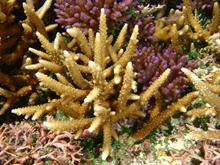Many people are drawn to the wonders of the ocean, and luckily there is lots of opportunity for being involved with marine activities.
Marine Biologists, in the purest form, usually study organisms which live in the marine environments and their interactions with each other and the surrounding environment. Work can be specific, such as dealing with specific fish species, the effect of the Crown of Thorns Star Fish on the Great Barrier Reef, or less specific such as examining the effect of human activities on marine environments (eg. sediment run-off, pollution, resource removal).
In saying that, there are many other areas that an understanding of marine biology can lead to. Whilst marine biologist in the strictest sense will generally have a University degree, there are many other jobs working with marine creatures that you can do with vocational qualifications.
Job Opportunities
Marine Biologists can gain employment in both government and non-government agencies. There is high competition for work strictly as a marine biologist, as they are not extremely common. However, there are many other job roles available in the field of marine biology. If you are enthusiastic about getting started in any way you can, gaining experience and working your way up it will increase your opportunity of finding a job as you can apply for a wider range of positions. Possible occupations include:
- Wildlife Educator at a conservation or tourism centre
- Animal attendant at "Sea World" or a similar tourist attraction
- Tour guide, for example whale watching, whale shark swimmer, dolphin watching.
- Field Researcher or research assistant
- Scuba Dive Instructor or Guide
- Snorkel or Free-diving instructor or guide
- Aquarium Assistant
- Ecotourism Guide
- Marine Park Manager
- Marine Planner
- Environmental Consultant
Where Could you Work
- Government Agencies (eg. GBRMPA)
 Ecotourism Tour Operations
Ecotourism Tour Operations- Universities and Colleges
- Private Sector (eg. marine resource companies)
- Self-employed (eg. Consultant)
- Aquariums
- Wildlife Conservation Organisations
Find out more about your career options
... Contact Us for FREE Career Advice
Remuneration and Advancement
Remuneration as a Marine Biologist can vary greatly but most full-time positions earn an average salary. Managers or specialised positions (i.e. Environmental Consultant, Planning Manager) can earn a comfortable salary but it may take some time and experience for advancement. Rates of pay can be below or at the minimum wage for people starting out (irrespective of whether they have a qualification or not), as many people want these roles. Positions in tourism operations can be long days of work with low pay rates, but the benefits of spending time in the ocean interacting with sea creatures.
How to Distinguish Yourself and get the Work
When starting out in this industry it is beneficial to offer your expertise as a volunteer with either government or non-government organisations. This not only gives you experience which is so highly desired by employers but also access to an organisation which you may wish to work for in the future.
Varying your skills can also set you apart and broaden your opportunities for further employment. It is good to have a speciality, however this can be limiting when looking for work.
Risks and Stress Rating
Because there are limited high level Marine Biology jobs available there can be stress around finding work. Many positions in marine biology can be contractual, sporadic, or seasonal, which can also lead to stress about finding work.
There are also risks involved due to the nature of the work. When working in the tourism industry stress can become a factor when coordinating groups of visitors in the water. There are risks when working in the marine environment, from the animals, equipment, situations, and the nature of the ocean.
Insurance
To work as a contractor in this field, you should consider personal indemnity insurance. A Professional Indemnity policy aims to shield the professionals' assets in the event of a claim, therefore ensuring that he/she is able to carry on their business. Some of the roles mentioned above are casual or permanent positions, others are filled by contractors. To minimise risk of liability, you must investigate and learn about the legal and professional requirements for practising in this field.
Recommended Courses/Career Pathways

To become a Marine Biologist you will need at least three years undergraduate qualifications and most likely either a Masters or PhD. However, there are also many jobs within the marine environment that do not require this level of study. For many of these jobs, a short course, such as the Marine Science Courses offered by ACS Distance Education will suffice.
These are:
Marine Studies - This is a strong foundation course for marine biology. In this course you will study in detail both marine environments (weather, nutrient cycles, reefs, shallow and deep water environments), marine animals and human impacts on marine environments.
Marine Studies II - This course follows on from Marine Studies I, focusing on a wider variety of marine organisms including sponges, echinoderms, marine plants, worms, arthropods and others.
Other Environmental Courses which may also be beneficial include:
Introduction to Ecology
Environmental Studies
Environmental Assessment
Contact us to talk about your options!
Create your own Certificate or Diploma
Incorporating the courses mentioned above into a Certificate/Diploma will give you a qualification enabling you to be competitive towards gaining jobs in Marine Biology.You may select subjects from our environmental courses including: wildlife management, ecology, marine studies, nature park management, conservation and environmental management. Also worth considering are our ecotourism courses, project management, personnel management, and workplace health and safety.
Professional Development and Career Changes
If you hold a degree in a discipline other Marine Biology; the value of getting a second degree will be greatly reduced. By studying short courses, certificates or diplomas in Marine Science, it is often possible to change careers into this industry.
Related Occupations
Oceanographer
Molecular Biologist
Environmental Scientist